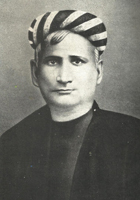Bankim Chandra Chattopadhyay
Bankim Chandra Chattopadhyay Poems
How hast thou lost, O month of honey and flowers,
The voice that was thy soul! Creative showers,
The cuckoo's daylong cry and moan of bees,
...
I show gratitude to thee, Mother,
richly-watered, richly-fruited,
cool with the winds of the south,
...
Mother, I bow to thee!
Rich with thy hurrying streams,
bright with orchard gleams,
...
"Mother, hail!
Thou with sweet spring flowing,
Thou fair fruits bestowing,
...
Bankim Chandra Chattopadhyay Biography
Bankim Chandra Chattopadhyay or Bankim Chandra Chatterjee (26 June 1838–8 April 1894) was a Bengali writer, poet and journalist. He was the composer of India's national song Vande Mataram, originally a Bengali and Sanskrit stotra personifying India as a mother goddess and inspiring the activists during the Indian Independence Movement. Chattopadhyay wrote thirteen novels and several 'serious, serio-comic, satirical, scientific and critical treaties' in Bengali. His works were widely translated into other regional languages of India as well as in English. Born to an orthodox Brahmin family, Chattopadhyay was educated at Hooghly Mohsin College founded by Bengali philanthropist Muhammad Mohsin and Presidency College, Calcutta. He was one of the first graduates of the University of Calcutta. From 1858, until his retirement in 1891, he served as a deputy magistrate and deputy collector in the Government of British India. Chattopadhyay is widely regarded as a key figure in literary renaissance of Bengal as well as the broader Indian subcontinent. Some of his writings, including novels, essays and commentaries, were a breakaway from traditional verse-oriented Indian writings, and provided an inspiration for authors across India. When Bipin Chandra Pal decided to start a patriotic journal in August 1906, he named it Vande Mataram, after Chattopadhyay's song. Lala Lajpat Rai also published a journal of the same name.)
The Best Poem Of Bankim Chandra Chattopadhyay
How hast thou lost, O month of honey and flowers
How hast thou lost, O month of honey and flowers,
The voice that was thy soul! Creative showers,
The cuckoo's daylong cry and moan of bees,
Zephyrs and streams and softly-blossoming trees
And murmuring laughter and heart-easing tears
And tender thoughts and great and the compeers
Of lily and jasmine and melodious birds,
All these thy children into lovely words
He changed at will and made soul-moving books
From hearts of men and women's honied looks.
O master of delicious words! the bloom
Of chompuk and the breath of king-perfume
Have made each musical sentence with the noise
Of women's ornaments and sweet household joys
And laughter tender as the voice of leaves
Playing with vernal winds. The eye receives
That reads these lines an image of delight,
A world with shapes of spring and summer, noon and night;
All nature in a page, no pleasing show
But men more real than the friends we know.
O plains, O hills, O rivers of sweet Bengal,
O land of love and flowers, the spring-bird's call
And southern wind are sweet among your trees:
Your poet's words are sweeter far than these.
Your heart was this man's heart. Subtly he knew
The beauty and divinity in you.
His nature kingly was and as a god
In large serenity and light he trod
His daily way, yet beauty, like soft flowers
Wreathing a hero's sword, ruled all his hours.
Thus moving in these iron times and drear,
Barren of bliss and robbed of golden cheer,
He sowed the desert with ruddy-hearted rose,
The sweetest voice that ever spoke in prose.

Bankim er kobita